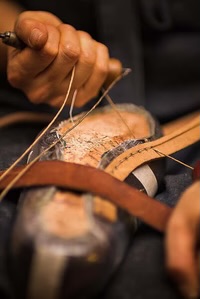Stefano Bemer began doing shoe repairs in Greve, Chianti, in 1983 after the town cobbler died. A local aristocrat noticed his work and showed Bemer his collection of John Lobb shoes. Inspired, Bemer moved to Florence to study design and train under a veteran shoemaker. His classic shoes (he preferred calf leather, but also used crocodile, ostrich, stingray and even toad) were shipped with a brush set in a monogrammed wooden wine box. Sadly, Stefano Bemer died after a long illness at only 48 years old but his legacy is being continued by his good friend Tommaso Melani!
Stefano Bemer’s shoemaking technique is based on the classic English Good Year method, that Stefano himself has tweaked to accomplish very specific quality and aesthetic goals. Nowadays, his method is considered to be one of the most refined in use and it’s taught to students all over the world. Although this English method, rigorously hand-lasted and hand-welted, he combines different methods in the production of casual boots and shoes to create a sense of ‘floating’ where the sole serves merely as a separation from the ground and lays barely visible underneath the shoe.
Stefano Bemer offers a range of services, including bespoke, custom, and ready-to-wear shoes. The bespoke process involves personalized fittings and meticulous craftsmanship, resulting in unique footwear tailored to each client. Notably, actor Daniel Day-Lewis apprenticed with Stefano Bemer in 1999, reflecting the brands esteemed reputation.
Stefano Bemer and his team emphasise quality over quantity, breathing new life into classic styles, preserving the artisanal tradition of shoe making, with transparency and authencity and taking the customer on an educational journey into show making. He also prioritises sustainability; ethically, respectfully delivering bespoke products for the clients without stealing from the environment or community. The leather comes from deforestation free, open range farms that are committed to the highest quality farming methods, allowing for extremely high quality raw leather material which vastly improves the longesvity of the shoe. The mills and tanneries used in the processing of the leather are always looking to new methods to minimise emissions and some are even nearly energetically and environmentally neutral already. Glue is not used in the making of this high quality shoes and therefore increase the life span of the shoe by decades and that the customer always has access to the in house repair service.

Improvements to their overall sustainability has been achieved and still striving for better by using organic wood for packaging, offsetting CO2 emissions by planting trees and even the dust bags are made from recycled materials.
Team, 26/02/2025 11:13:20








